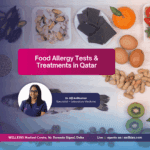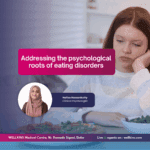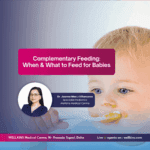Author: Dr. Joanne Mae J Villanueva, Pediatrics at Wellkins Medical Centre
Are you a new parent in Qatar, eager to give your newborn the best possible start in life? Among the myriad choices you’ll face, one stands out for its unparalleled benefits: breastfeeding. While the focus is often on the mother’s experience, the advantages for your baby are truly remarkable and extend far beyond basic nutrition. Dismissing breast milk as simply a food source overlooks its powerful role in building your baby’s immunity, fostering optimal development, and laying the foundation for long-term health. The good news is that breastfeeding is a natural and accessible way to provide your baby with a unique and complete form of nourishment, ensuring their well-being and strengthening your bond.
Breastfeeding is the process by which a mother provides her infant with breast milk, a dynamic and complex living fluid uniquely tailored to the baby’s needs. Beyond its nutritional components, breast milk is packed with antibodies, living cells, enzymes, and hormones that actively protect and nurture the growing infant. Recognizing these crucial components early is vital for understanding its profound impact on your baby’s health.
Beyond providing essential nutrition, breastfeeding offers a wealth of benefits for your baby. It’s a complex process that triggers positive physiological and developmental responses, aiding in their growth and providing lifelong health advantages.
Breastfeeding Benefits for the Baby
The most common benefits of successful breastfeeding is a thriving, healthy baby with robust immunity. Indicators of breastfeeding benefits include:
- Enhanced Immunity: Fewer ear infections, respiratory illnesses, and diarrheal
episodes. - Optimal Growth and Development: Supports healthy brain development and
cognitive function. - Reduced Risk of SIDS: Lower incidence of Sudden Infant Death Syndrome.
- Fewer Allergies and Asthma: Decreased likelihood of developing allergic
conditions. -
Easier Digestion: Breast milk is easily digestible, leading to less gas and
constipation. - Reduced Risk of Chronic Diseases: Lower risk of obesity, type 1 and 2 diabetes,
and certain childhood cancers later in life. - Stronger Mother-Baby Bond: Promotes emotional security and attachment.

What Promotes Breastfeeding Benefits for Babies?
Several factors contribute to maximizing the benefits of breastfeeding for infants:
- Exclusive Breastfeeding: Providing only breast milk for the first six months.
- On-Demand Feeding: Allowing the baby to nurse whenever they show hunger cues.
- Proper Latch and Positioning: Ensures the baby gets enough milk and prevents
nipple damage for the mother. - Maternal Health and Nutrition: A healthy mother produces optimal breast milk.
- Avoidance of Pacifiers (initially): To ensure proper sucking technique and milk
supply establishment. - Skin-to-Skin Contact: Promotes feeding cues and successful latching.
When to Seek Medical Attention for Baby’s Feeding
While breast milk is the ideal food, it’s important to consult a pediatrician if:
- Your baby is not gaining weight adequately or is losing weight after the initial days.
- Your baby is not having enough wet or soiled diapers.
- Your baby seems unusually lethargic or unresponsive.
- Your baby is excessively jaundiced. .
- You have concerns about your baby’s feeding habits or overall health.
- Your baby is showing signs of dehydration (e.g., sunken soft spot, dry mouth, no
tears).
Proactive Steps: Ensuring Your Baby Thrives with Breastfeeding
While many new parents in Qatar and around the world understand the general concept of breastfeeding, the most effective strategy is often proactive engagement in ensuring its benefits are fully realized for their baby. By making conscious, informed choices, you can significantly enhance your baby’s health, development, and long-term well-being.
The profound benefits of breast milk for infant’s stem from its unique composition and dynamic nature. Factors that ensure your baby receives the optimal advantages include:
- Biological Perfect Match: Breast milk adapts to your baby’s changing nutritional
and immunological needs as they grow. - Immune System Support: Antibodies, white blood cells, and other protective
factors directly transfer from mother to baby. - Digestive Harmony: Enzymes in breast milk aid digestion, making it gentle on your
baby’s immature gut.
By addressing these factors head-on, you can take a powerful step towards a healthier future for your child.
 1. Mindful Initiation and Exclusive Breastfeeding
1. Mindful Initiation and Exclusive Breastfeeding
What you do from birth sets the stage for your baby’s optimal intake of breast milk.
- Initiate Breastfeeding Within the First Hour: This early exposure to colostrum, the first milk, provides vital antibodies and nutrients.
- Practice Exclusive Breastfeeding for Six Months: Avoid introducing formula,
water, or other foods unless medically indicated. This ensures your baby receives
the full benefits of breast milk. - Nurse On Demand: Allow your baby to feed whenever they show hunger cues
(rooting, sucking hands, fussing). This ensures adequate intake and signals your
body to produce enough milk.
2. Strategic Feeding Practices
Beyond just providing milk, how you feed your baby impacts their intake and your bond.
- Ensure Proper Latch: A deep, comfortable latch is crucial for your baby to get
enough milk and for preventing nipple soreness. Seek help from a lactation
consultant if you’re unsure. - Recognize Hunger Cues: Learn to differentiate between early hunger cues (stirring,
mouth opening, rooting) and crying, which is a late hunger cue. - Respond to Growth Spurts: Your baby may feed more frequently during growth
spurts. Respond to these increased demands to maintain your milk supply.
3. Optimize Your Baby’s Feeding Environment
Creating a conducive environment supports successful feeding and bonding.
- Maintain Skin-to-Skin Contact: Frequent skin-to-skin contact, especially in the
early weeks, helps regulate your baby’s temperature, heart rate, and breathing, and
encourages feeding. - Feed in a Calm, Quiet Environment: Minimize distractions during feeding times to
allow your baby to focus on nursing. - Burp Your Baby Regularly: This helps release trapped air and makes your baby
more comfortable during and after feeds.
4. The Power of Monitoring and Professional Guidance
Staying vigilant and seeking expert advice are key to ensuring your baby thrives.
- Monitor Diaper Output: Track wet and soiled diapers to ensure your baby is getting
enough milk. Your pediatrician can provide guidelines for age-appropriate output. - Attend Regular Well-Baby Checks: Your pediatrician will monitor your baby’s
weight, growth, and development, ensuring they are meeting milestones. - Seek Pediatric Advice for Concerns: If you have any worries about your baby’s
feeding, weight gain, or overall health, consult your pediatrician promptly.
Worried about your baby’s feeding? Ignoring potential issues can affect their growth and overall well-being, making timely and precise assessment essential. At Wellkins Medical Centre, we understand your concerns. Our comprehensive pediatric care provides new parents with the support they need.
Book a consultation with our specialist pediatrician for personalized guidance. www.wellkins.com/visit


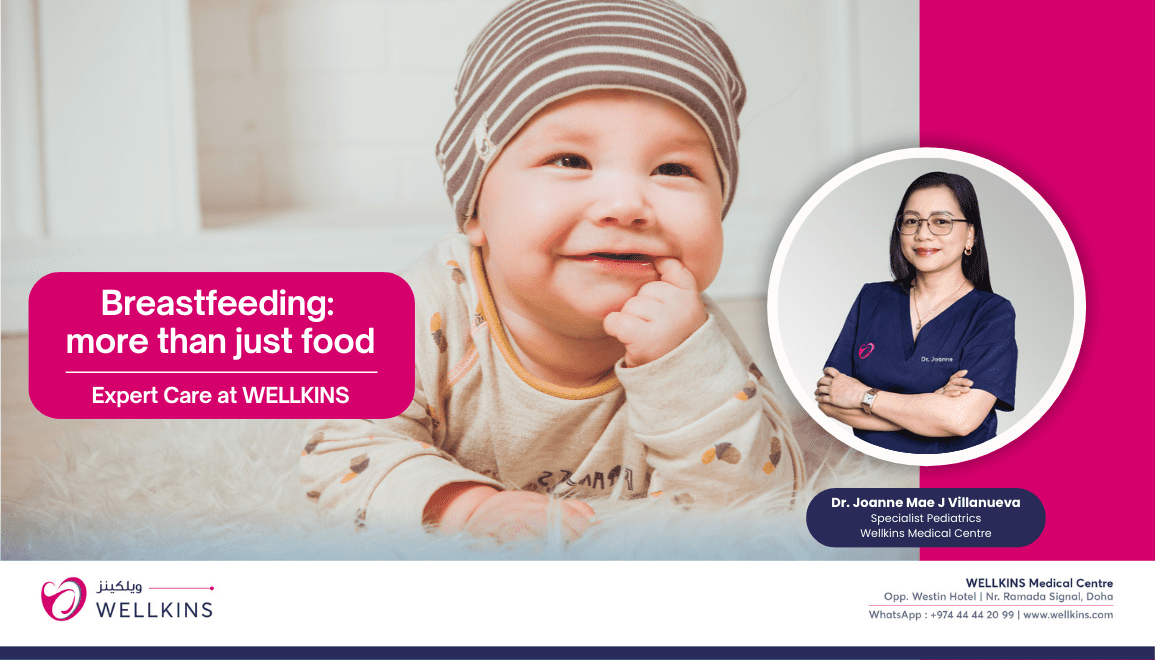
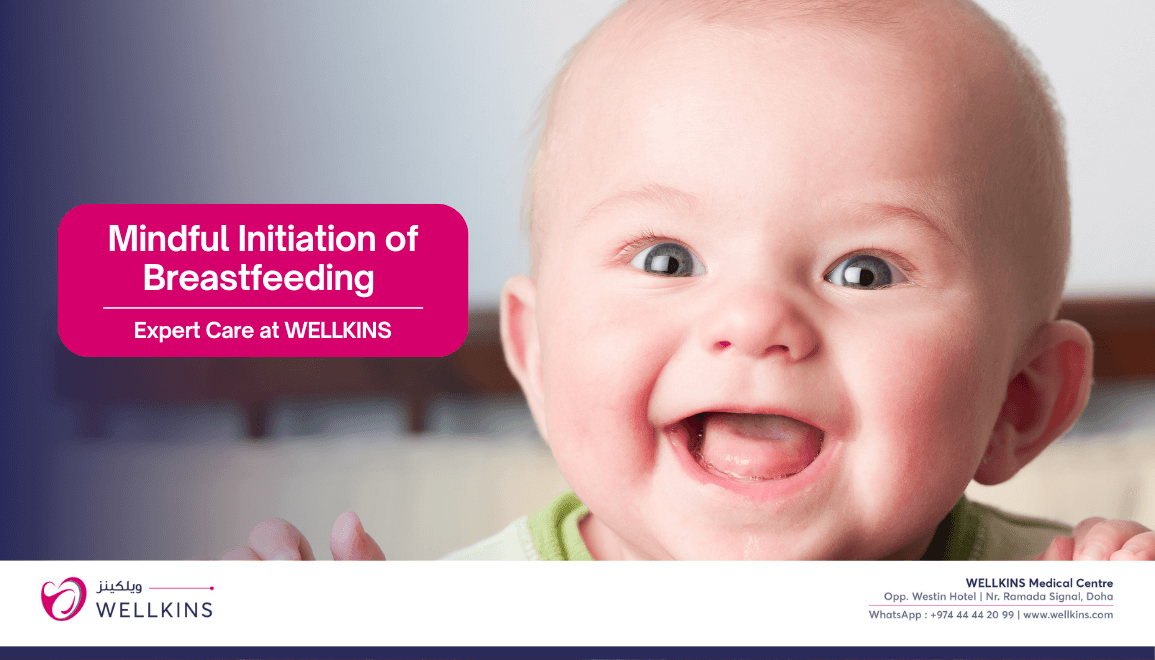 1. Mindful Initiation and Exclusive Breastfeeding
1. Mindful Initiation and Exclusive Breastfeeding 